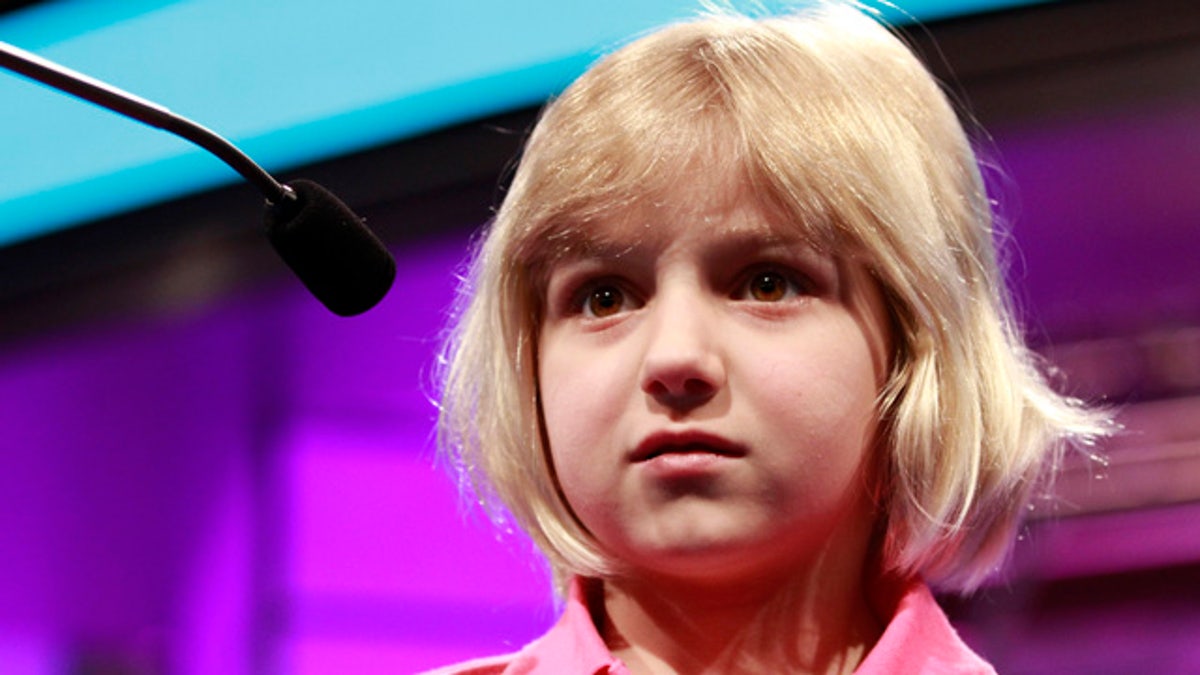
May 30, 2012: Lori Anne Madison, 6, of Woodbridge, Va., the youngest speller ever to compete in the National Spelling Bee, reacts after misspelling her word, ingluvies, in the third round of the bee in Oxon Hill, Md. She will not be moving on to the semifinals. (AP)
OXON HILL, Md. – The most experienced speller remaining in the National Spelling Bee breezed through most of two semifinal rounds with his usual confidence. But with one word separating him from his first time in the finals, he was flustered.
"Kanaima."
Nicholas Rushlow went through the usual checklist, asking the definition -- an evil spirit, believed to be an avenger. Next he asked for the country of origin, which was British Guyana. Pronouncer Jacques Bailly used it in two sentences.
"Is there anything else I didn't ask?" Rushlow said.
After getting the word right, he mouthed a word that was easy to spell -- "Whoa!" -- then bounded back to his seat and high-fived his few remaining competitors.
Nine spellers made it through the semifinal rounds Thursday and will return to the stage at a convention center outside Washington that night. They nailed words derived from Greek, Latin, French, German, Hawaiian and Afrikaans. They got proper names and obscure medical terms.
Lena Greenberg, an excitable home-schooled 14-year-old from Philadelphia, became the last to make the finals when she spelled "cholecystitis" -- an inflammation of the gallbladder. She said she didn't know the word but was able to piece it together. After spelling it right, she ran back to her chair, handed out high fives and buried her face in her hands.
"It means so much," Greenberg said. "I can't believe I got here! It doesn't make sense. There were a lot of the words in the semifinals I didn't know."
Forty-one spellers, meanwhile, heard the dreaded bell that signals an incorrect spelling. Those included one of the favorites, 10-year-old Vanya Shivashankar of Olathe, Kan. The younger sister of the 2009 champion got the only perfect score in the preliminary rounds.
Breezily confident through the first two semifinal rounds, Shivashankar was flummoxed by "pejerrey," a small fish. She went with "perjere."
"Thank you," she said, and walked offstage with her head held high. She'll have three more years to compete if she chooses.
This is Rushlow's last chance. The 14-year-old from Pickerington, Ohio, has competed in the Scripps National Spelling Bee every year since 2008. Last summer, in between swimming practices, he spelled every word in the dictionary for practice, a process that took 600 hours. His mother estimates he's spent 8,000 hours studying over the past five years.
He also has his quirks: He eats pancakes before every bee and has worn the same shirt, a yellow polo with black-and-white stripes, the past three years. He owns more than one and wasn't sure if he had on the same one he wore Wednesday.
"My mom handles that," Rushlow said.
The other fifth-time competitor, Rahul Malayappan, did not make the finals.
Arvind Mahankali, 12, of Bayside Hills, N.Y., a finalist the last two years, made it three years in a row when he spelled "phrontistery." A tennis player and aspiring physicist, he raised his arms in victory as he walked away from the microphone.
The semifinalists also include Gifton Wright of Spanish Town, Jamaica, who could become the second Jamaican winner in spelling bee history. His coach, the Rev. Glen Archer, also guided the previous Jamaican winner, Jody-Anne Maxwell, in 1998.
Wearing a hooded black cardigan with green trim that suggested the Jamaican flag, Wright got to the finals by spelling "Gleichschaltung," the process of achieving uniformity through oppression.
"I knew it," the unfailingly polite 14-year-old said afterward.
When asked how he knew it, he told a reporter: "Training, sir."
This week, Scripps announced tentative plans for a world spelling bee with teams of spellers from dozens of countries. Once that gets off the ground, the National Spelling Bee would be closed to international participants.
This year's winner gets $30,000 in cash, a trophy, a $2,500 savings bond, a $5,000 scholarship, $2,600 in reference works from the Encyclopedia Britannica and an online language course.
The other semifinalists are Snigdha Nandipati, 14, of San Diego; Frank Cahill, 14, of Parker, Colo.; Stuti Mishra, 14, of West Melbourne, Fla.; Jordan Hoffman, 14, of Lee's Summit, Mo.; and Emma Ciereszynski, 14, of Dover, N.H.
Ciereszynski spelled "ouabain" -- a toxic substance used as poison on an arrow -- to make the finals.
"I think I might know this!" she said after the word was read. As Bailly read the definition, she smiled, giggled and bounced on her heels.
Her place in the finals secured, she held up her arms and exclaimed, "Yes!"

